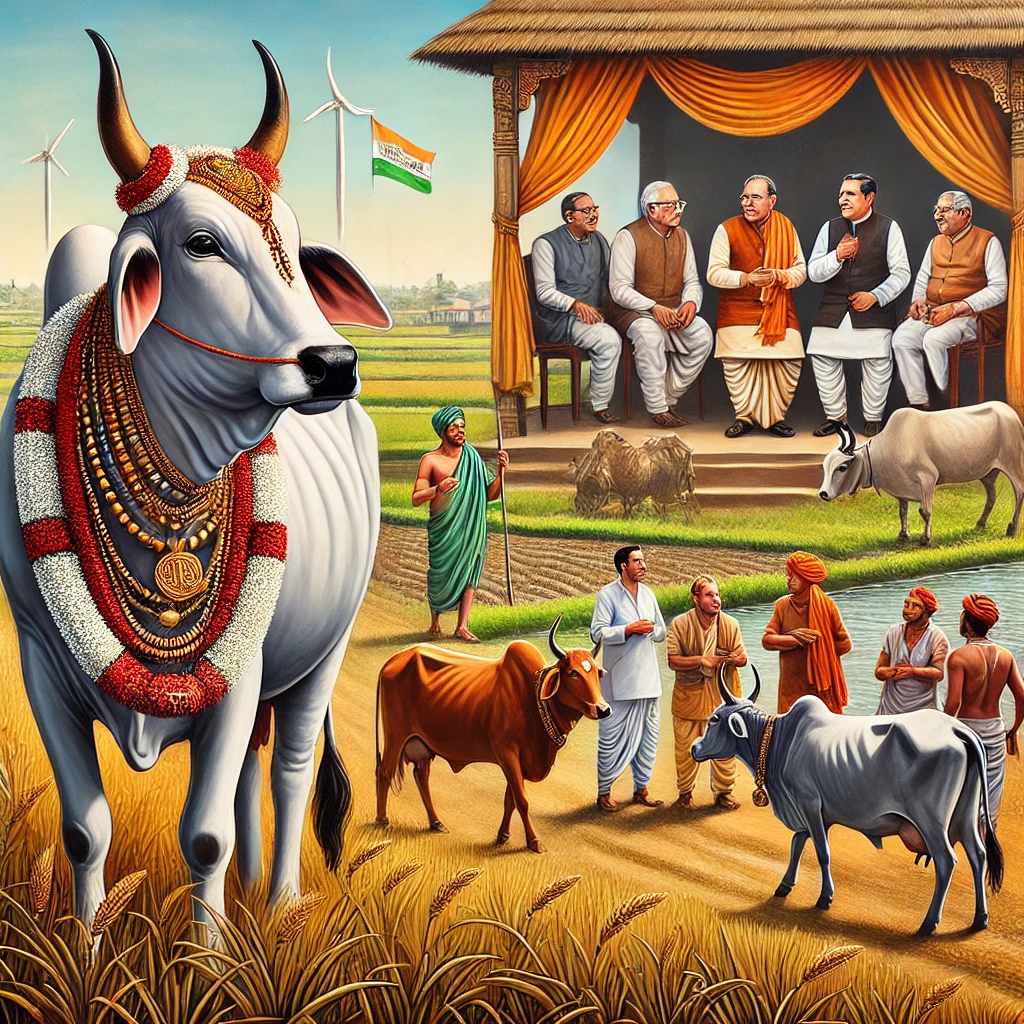As Maharashtra prepares for its upcoming state elections, the recent decision to grant “Rajyamata” (Queen Mother) status to indigenous cows has stirred both admiration and criticism. This announcement, made by the state’s dairy development department, also includes a daily ₹50 subsidy per cow for their care, aiming to encourage the conservation and protection of India’s native cattle breeds. This editorial explores the implications of this decision, analyzing its cultural, political, and economic dimensions.
Cultural Significance of Indigenous Cows
India’s relationship with cows is deeply rooted in its cultural and religious traditions. For centuries, cows have been revered, particularly in Hindu society, as symbols of life and nurturing. Indigenous breeds, such as Gir, Sahiwal, and Tharparkar, have not only played a crucial role in rural economies but are also considered integral to India’s agrarian ethos. Granting “Rajyamata” status to desi cows seems like a nod to this longstanding tradition, elevating these animals to a revered position. This decision, in its cultural essence, reflects the state’s acknowledgment of the cows’ significance in India’s socio-religious fabric.
Economic Implications: A ₹50 Subsidy for Cow Rearing
Beyond symbolism, the policy comes with financial backing, offering ₹50 per day to farmers and herders for maintaining each indigenous cow. While this subsidy may appear nominal, its aggregate effect could alleviate some of the financial burdens of rural communities. Maharashtra, with a significant agrarian population, often sees its cattle as critical for both agriculture and dairy production. The financial support could encourage the revival of indigenous breeds that have been overshadowed by higher milk-producing exotic breeds in recent years.
However, the effectiveness of this subsidy raises questions. Will ₹50 a day truly cover the costs of rearing a cow, including fodder, healthcare, and shelter? More importantly, will this policy help boost the productivity of indigenous breeds, which have historically been less favored due to lower milk yield compared to hybrid varieties?
Political Timing: Strategy or Sincerity?
The announcement comes just before the Maharashtra elections, a time when governments often unveil populist schemes aimed at garnering rural support. The decision to elevate indigenous cows to “Rajyamata” status, while rooted in tradition, has not escaped the gaze of political analysts who view it as an attempt to secure the rural and Hindu vote bank. With the BJP-led government keen on consolidating its position in Maharashtra, this move could resonate with sections of the population for whom the protection of cows is a deeply emotional and cultural issue.
Critics, however, argue that the decision is more about political optics than genuine concern for indigenous breeds. The timing of the announcement, close to the elections, suggests a tactical move aimed at capturing votes in rural and religiously inclined constituencies.
Long-term Sustainability and Animal Welfare
While the policy is likely to receive immediate support, questions remain about its long-term sustainability. A subsidy alone may not be enough to ensure the welfare of cows, especially in times of drought or fodder shortages. There needs to be a comprehensive plan to address the challenges of rearing cattle, such as access to veterinary care, proper nutrition, and the establishment of infrastructure like gaushalas (cow shelters).
Additionally, the economic productivity of indigenous breeds needs to be enhanced through better breeding practices, research, and technology. If the government is truly committed to reviving these breeds, it will need to invest in more than just subsidies—it will require a multi-pronged approach involving animal husbandry reforms, farmer education, and financial support systems.
Conclusion
The decision to grant “Rajyamata” status to desi cows is a culturally significant step that aligns with India’s traditional values. However, its political timing and economic feasibility remain points of debate. While the ₹50 subsidy may offer some relief to rural communities, a more holistic approach is needed to ensure the welfare and productivity of indigenous breeds in the long term. As Maharashtra heads to the polls, it remains to be seen whether this policy will prove to be a lasting benefit for rural India or a temporary political gesture.
The coming months will reveal whether this move will genuinely help preserve the nation’s native cattle or if it will remain a symbolic gesture in the annals of election politics. #RajyamataStatus #DesiCows #MaharashtraElections #CowProtection #IndianAgriculture #PoliticalStrategy #AnimalWelfare







